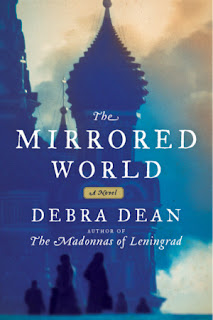The Mirrored World
Summary (from the publisher): The critically acclaimed author of The Madonnas of Leningrad ("Elegant and poetic, the rare kind of book that you want to keep but you have to share" --Isabel Allende), Debra Dean returns with The Mirrored World, a breathtaking novel of love and madness set in 18th century Russia. Transporting readers to St. Petersburg during the reign of Catherine the Great, Dean brilliantly reconstructs and re-imagines the life of St. Xenia, one of Russia's most revered and mysterious holy figures, in a richly told and thought-provoking work of historical fiction that recounts the unlikely transformation of a young girl, a child of privilege, into a saint beloved by the poor.
Review: I received a copy of this book from Harper Collins.
The Mirrored World is based on the life of St. Xenia of St. Petersburg, who supposedly gave all her possessions to the poor after the death of her husband, and wandered the streets for 45 years wearing her husband's military uniform. Yet what the jacket cover of this novel fails to tell you is that this book is narrated by Xenia's cousin Dasha, and is largely about her life. Dasha provides a levelheaded account of events, particularly necessary since Xenia is portrayed as having lost her mind with the grief of the death of her child and husband.
I was frustrated with the narration of this novel, which felt very fragmented. Years of childhood pass in the first few chapters without description. Xenia is quickly married and then suddenly celebrating her fourth year of marriage. It was also unclear where Dasha and her family fall socially - they are invited to royal parties, but yet the family constantly seems on the verge of poverty.
Additionally, considering that St. Xenia is considered a revered figure in Russia, I didn't think Dean captured this fact through Dasha's narrative. While outsiders seem to respect her giving nature, her family is mostly exasperated with her behavior and she is portrayed as a mentally ill woman who thoughtlessly gives every worldly possession away, even when it will serve no purpose - for example, giving lace gloves to a freezing child on the street.
Finally, this book felt like a cheap imitation of many of the themes of another Russian novel, Anna Karenina - doomed love, love destroying females, tragic endings, etc. Yet where that novel was long, this was short. Too short to flesh out the characters or develop the true meaning of Xenia's tragic life.
Stars: 2.5



Comments
Post a Comment